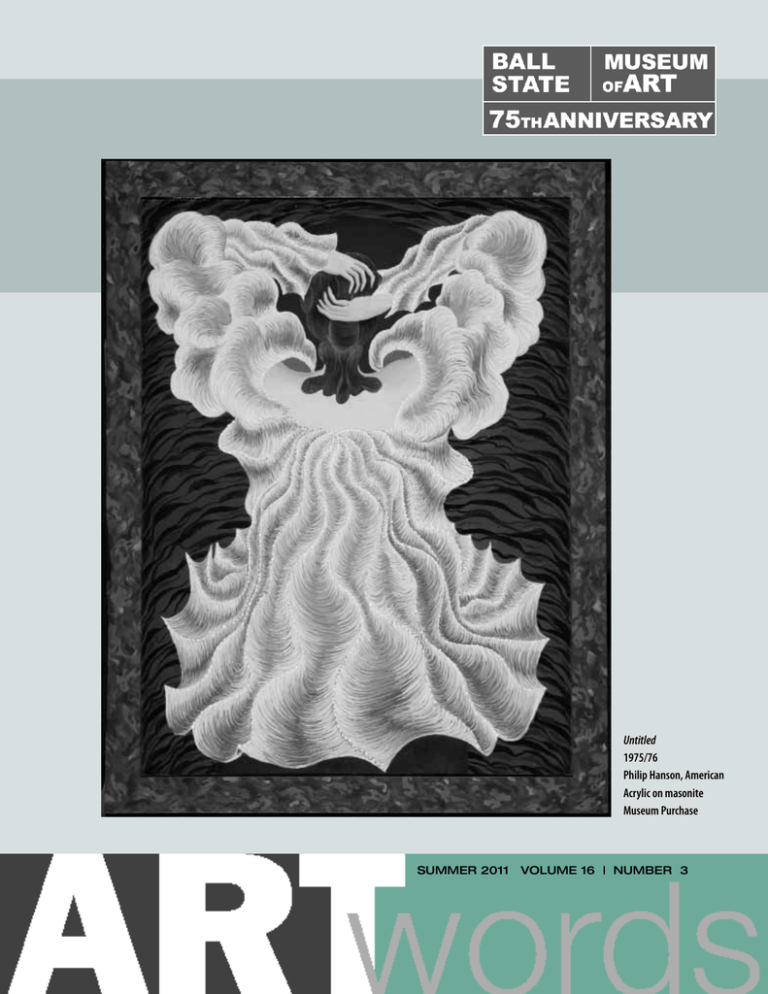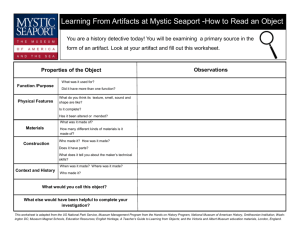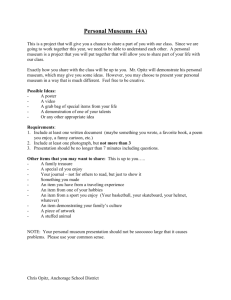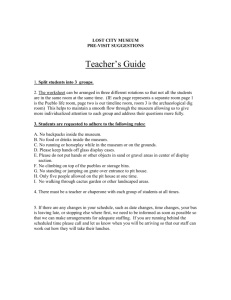
Untitled
1975/76
Philip Hanson, American
Acrylic on masonite
Museum Purchase
sUMMER 2011
Volume 16 | Number 3
from the director…
The Gala celebration marking the museum’s 75th anniversary
Ball State University Museum of Art
Serving East Central Indiana since 1936
Friends Executive Committee
Sandra Kelly
Chairperson
Cecil Bohanon
Melissa Daniels
Carol Flores
Sarojini Johnson
Joan Malje
Fred Meyer
Olga Mounayar
Patricia Schaefer
Kent Shuff
Donald Whitaker
Ex officio
Peter F. Blume
Director, BSUMA
Robert Kvam
Dean, College of Fine Arts
Sarah Jenkins
Director of Development
BSUMA Staff
Peter F. Blume
Director
Carl Schafer
Associate Director
Tania Said Schuler
Curator of Education
Randy Salway
Exhibition Designer/Preparator
ARTwords
Editor | Carl Schafer
Writer | Carmen Siering
Design | Marin & Marin
in the Fine Arts Building was a party to remember. Thanks to
presenting sponsor Raymond James Associates for the underwriting
that made the evening a financial success as well. Additional thanks
goes to Westminster Village, Pat Schaefer, Vera Mae’s Bistro, and
Ball State University’s own College of Fine Arts. Melissa Daniels,
along with the Gala Committee, arranged a beautiful event.
They thoughtfully used Childe Hassam’s painting Reflection (1917)
on the invitation, one of the images to trigger reflection on the past.
This was among the museum’s early acquisitions, a gift from
Mrs. Albert Beveridge.
The recent work titled Be Like Water, by artist Aurora Robson,
is here for an extended installation in the sculpture court. Robson
is engaged in putting works of art to political purpose, in this case,
the plastic waste created by the bottled water craze. Ball State’s
green initiatives in many areas are reflected in Robson’s engagement with realpolitik of the moment.
As we start planning for expansion into the east and west wings of the second floor, we have yet another
opportunity to shape the future of how we present our collection. Available right now is a new publication
The Ball State University Museum of Art at 75: the Museum and its Collection to which I have contributed an
essay about some of the collectors who have had a transformative effect on this institution. The modesty that
has accompanied the gifts of single works of art as well as whole collections from various members of the
Ball family and their foundations has eluded telling in any of the existing literature about the family, their
industry, or even their civic lives in Muncie in the first half of the twentieth century. Their ongoing collective
legacy in the fine arts at this museum is, I believe, unequalled at any university museum in the United States.
That the story has gone untold for so long is a testament to their vision and generosity. It is a story that
parallels the development of an art market in the United States, and reflects the swings in taste affecting
the critical and commercial values of works of art over a one hundred year period.
It is a very exciting time to be at this museum with so much going on in programming, collection
development, and in physical expansion. Come see.
ARTwords is published
three times a year by the
Ball State University
Museum of Art
Muncie, IN
©2011. All rights reserved.
2
Be Like Water, 2011
Aurora Robson
Mixed media, plastic
Lent by the Artist
On view May 20 - August 28, 2011
aspects of american painting
from the 1970s
A
rt and life are undeniably intertwined, and
never more so than in the decade that was the 1970s.
While contemplation of the 1960s may conjure up
images of turbulent social change, it was during the
next decade that American society began to feel
the impact of civil rights legislation, the women’s
liberation movement, the sexual revolution, and so
much more. These societal changes are reflected
in the works of art celebrated in Aspects of American
Painting from the 1970s.
“For artists, the 1970s was a rather pluralistic
decade, with a lot of individualism afoot,” says
Director Peter Blume. “Artists were searching for
a personal language and trying out new things.”
Some of those new things can be found in the
work of the Chicago Imagists, a group of artists
who relied on popular cartoons and cheap advertising
to inform their work.
“The Chicago Imagists really loved their lowbrow
inspirations, and you can see the warmth and passion
they were putting into their imagery,” says Blume.
“They were making the obscene seen, giving the
things we tend to ignore or avoid a stage and
an audience.”
Two of the original Chicago Imagists, Ed Paschke
and Barbara Rossi, are featured in the exhibition.
Women were front and center in the 70s, with
important female artists like Katherine Porter using
art to make political statements (Chalatenango, 1980).
Joan Snyder (To Grow, 1973), whom Blume calls
“the darling of the 70s,” would continue to produce
art for more than four decades and go on to be
named a MacArthur Fellow in 2007.
Blume feels the time has come to take another
look at the paintings from this decade.
“It’s been thirty years, and upon reflection we
can see it was a very interesting time,” he says.
“There was minimalism, which was a very dogmatic
way of looking at what art could be, but at the same
time there were other more experimental
and expansive things going on.”
TOP left: Schizophrenic Discovery, 1977
Christina Ramberg, Acrylic on masonite. Museum Purchase.
bottom LEFT: Tiera del Sienna, 1977
Ed Paschke, Oil on canvas. Museum Purchase.
3
CALENDAR of EVENTS
summer fridays • 3:00 - 4:00 pm
may - August
Meditation in the Museum
Every Friday during the summer, the Ball State
University Museum of Art offers a cool, calm,
and quiet meditation space from 3 to 4 pm
near the Amidha Buddha on the balcony.
This self-directed experience is a wonderful way to
start your weekend. You can find free downloadable
relaxation MP3s for your computer, IPOD, or other
devices at: www.bsu.edu/workingwell
NOTE: Occasional evening events will limit access.
In partnership with Ball State University Working Well
may
11 wednesday
• 7:30 am - 5:30 pm
In honor of the Ball State University Museum
of Art’s 75th anniversary, we will visit another
university art museum—the Snite Museum of Art
at the University of Notre Dame. We will be
met by Director Charles Loving, provided a
Docent’s Choice tour, and Dr. Robin Rhodes
will discuss the recently reinstalled Greco-Roman
Antiquities Collection.
june
11 saturday
summer
• 4:30 pm
Arts & Music Festival on the Green
The Muncie Arts and Culture Council, with the
Muncie Symphony Orchestra taking the stage at 7 pm,
present a celebration of arts on the “front lawn” of the
Ball State University Museum of Art. Watch for special
announcements and surprises to conclude the museum’s
75th anniversary, including special children’s activities.
18 saturday • 2:30 pm
Tour Time: Introducing the
Ball State University Museum of Art
Drop in for a 75th Anniversary tour of the museum
and learn about the collection and the history
of its development. Docents will also feature
3-4 works of art for discussion.
Groups of 5 or more, please call 765.285.3372
All programs are free unless otherwise noted.
Programs are subject to change without notice.
* The cost to join the Ball State University Museum of Art
Alliance is $15 for Friends members,
$40 for non-members.
The trip includes transportation to and from
the Ball State University Alumni Center, a special
luncheon at Sorin’s Restaurant at the Morris Inn
on the campus of the University of Notre Dame,
guided tours, and admission to the Snite Museum
of Art.
Alliance Members: $75.75
Ball State University Museum of Art Members: $90.75
Non members: $100.75
21 saturday
• 2:30 pm
Tour Time: Introducing the
Ball State University Museum of Art
Drop in, tour the museum, and learn about the
collection and the history of its development.
Docents will also feature 3-4 works of art
for discussion.
Groups of 5 or more, please call 765.285.3372
30MOnday
Museum closed in observance of
Memorial Day
4
Big Walker, 1975, Irving Kriesberg, American, 1919-2009,
Oil on canvas. Anonymous gift.
CALENDAR of EVENTS
summer
july
4 monday
august
20 saturday
Museum closed in observance of Independence Day
Tour Time: Introducing the
Ball State University Museum of Art
10 sunday
• 2:00 - 4:30 pm
Family Day: 1970s Art & Life
In conjunction with Aspects of American Painting from
the 1970s, the Ball State University Museum of Art is
transformed for kid-friendly tours and hands-on activities
emphasizing the treasures and highlights in the collection
from the 1970s.
Drop in for a 75th Anniversary tour of the museum
and learn about the collection and the history
of its development. Docents will also feature
3-4 works of art for discussion.
Groups of 5 or more, please call 765.285.3372
22 monday
In conjunction with the Ball State University Art Education Club
Fall Semester begins
16 saturday
26 friday
• 2:30 pm
Tour Time: Introducing the
Ball State University Museum of Art
Drop in for a 75th Anniversary tour of the museum
and learn about the collection and the history
of its development. Docents will also feature
3-4 works of art for discussion.
Groups of 5 or more, please call 765.285.3372
• 2:30 pm
• 5:00 - 7:00 pm
Quad Bash
To welcome back students, in conjunction with a
movie and other outdoor activities on the Quad,
the Ball State University Museum of Art will stay
open late offering freebies, activities, and time to
explore after hours.
Ice cream available for the first 100 visitors.
Fishstick, 1980, Barbara Rossi, American, b. 1940,
Acrylic on masonite. Museum Purchase.
5
The ball state university
museum of art at 75
The Museum & a History of Its Collection
A
s the Ball State University Museum of Art wraps up its 75th anniversary year, it seems only
fitting to publish a book commemorating the occasion. The Ball State University Museum of Art
at 75: The Museum and a History of Its Collection features 120 full-color photographs as well as a
comprehensive history of the museum.
“The substance of the book is the evolution of the museum through several different missions,
beginning in 1935 up to the present,” says Director Peter Blume, author of the historical essay in
the publication. “It’s also the story of the people who were transformative in the development of
the collection.”
In his essay, Blume writes that while art and art collecting are barely mentioned in official histories
of the Ball family, the truth is the scale of Frank C. Ball’s art collection was considerable, and the
museum itself, which started as the Art Gallery, was made possible by a gift from the Ball family.
While the Ball name is a significant thread that runs through the history of the museum, other
historical moments are also considered, from the 1991 change in name from the Art Gallery to the
Museum of Art, as well as the changes in leadership over the years and how that would impact the
formation of the collection.
Focusing on the things that have gone into making the museum what it is today, the historical
essay lends itself naturally to photographs of works from the collection.
“The is the first time we have taken the collection and really tried to capture its character,” says
Associate Director Carl Schafer. “This book is lavishly illustrated with gorgeous photographs that
do just that.”
The Ball State University Museum of Art at 75 can be purchased at the museum.
Call 765.285.5242 for more information.
6
On view through August 28, 2011
Childe Hassam
Paintings & Prints
T
o Ball State University Museum of Art patrons,
Childe Hassam’s Bowl of Goldfish (1912) is quite
familiar. It has remained a favorite painting
long after the 1985 exhibition Childe Hassam
in Indiana. As Alain Joyaux noted in the book
of the same name, the exhibition was held to
celebrate the 50th anniversary of what was then
known as the Art Gallery, so it is fitting that at
the conclusion of its 75th anniversary celebration,
the museum has chosen to once again feature
the artist in the exhibition Childe Hassam:
Paintings and Prints.
Frederick Childe Hassam first found success
as an illustrator for books and magazines in
the late 1800s. He returned to graphic media
after the turn of the century, first to etching
and drypoint in 1915, then to lithography in
1917. However, Hassam is best known for his
accomplishment as a painter within the
American Impressionist movement.
Hassam’s work has long been important to
the Muncie art community. In 1907, the newly
organized Muncie Art Association set its eyes
on acquiring Entrance to the Sirens’ Grotto,
Isles of Shoals (1902). Local historian Ned Griner
writes that while Hassam discounted the cost of the
painting to a mere $400, it was still $300 over the
group’s budget. Thanks to a subscription drive
undertaken by Frank C. Ball and George McCulloch,
the money was raised, and the group made what
became a significant purchase.
Entrance to the Siren’s Grotto, as well as
Bowl of Goldfish, will be on view during the
exhibition, as will The Old Lyme Bridge (1903)
and Reflection (1917). In addition to the oils, a
selection of Hassam’s prints will be included in t
he exhibition.
TOP RIGHT: Bowl of Goldfish,1912
Childe Hassam, Oil on canvas.
Frank C. Ball Collection.
Gift of the Ball Brothers Foundation.
bottom RIGHT: The Bridge at Lyme
Childe Hassam, Oil on canvas.
Gift of the Edmund Burke Ball heirs.
7
summer 2011
volume 16 | number 3
a newsletter for the friends of
museum hours
Monday - Friday
9:00 am - 4:30 pm
Parking in the
McKinley Ave. garage
between Riverside Ave.
& University Ave.
Muncie, IN 47306
Saturday & Sunday
1:30 pm - 4:30 pm
765.285.5242
free admission
www.bsu.edu/artmuseum
75th Anniversary Season Sponsor • Indiana Public Radio
in this ISSUE
In this issue we take time to reflect on
The Ball State University Museum of Art at 75:
The Museum and a History of Its Collection,
a historical publication that caps off our anniversary
year. We also look back at a decade in art with
Aspects of American Painting from the 1970s,
and revisit old favorites with Childe Hassam:
Paintings and Prints. PLUS…Notes from the Director,
our Calendar of Events, and much more.
new in the galleries…
leon polk smith
With black blocks interspersed with blocks in three colors (gray, yellow,
and blue), the latest acquisition to the Ball State University Museum of Art
is by American painter Leon Polk Smith. The 1946 work, labeled simply
Untitled, very clearly shows the debt the artist owes to Piet Mondrian and
the non-representational form Mondrian termed Neoplasticism.
Polk Smith began painting in the 1930s, focusing on Constructivism
and De Stijl. He later developed his own style, one in which shapes twist
and turn. Polk Smith continued to expand and explore design style until
his death in 1996.
“This painting is the antithesis of the dominant art movement at that
moment, which was abstract expressionism,” says Director Peter Blume.
Untitled, 1946, Leon Polk Smith, Oil on Canvas.
Lent by David T. Owsley






